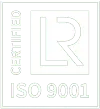A compact but powerful nanoindenter
Piuma, the entry-level platform within the Optics11 Life portfolio, is an excellent choice for material science applications due to its robust and precise measurement capacity, and the ability to adapt to a wide range of sample sizes. This compact powerhouse is an ideal addition to any lab, taking up minimal space whilst offering a quick startup and effortless integration into the research process. It enables researchers to characterize materials from micro to macro scales, providing true insights in the role of mechanics in biology and biomaterial science. With Piuma, researchers gain access to an instrument that is easy to use and quick to operate, whilst gaining detailed mechanobiological insights necessary to accelerate their research.
Quick Start-Up
Its compact design, ease of use and flexibility in measuring diverse samples make mechanical characterization effortless. It is an excellent expansion of your laboratory infrastructure, allowing you to collect hundreds to thousands of measurements over tens of experiments.
Whether you are preparing hydrogel samples in a dish, on a glass slide, in a well plate, or as a coating of an object, simply place it under the Piuma and obtain your first result within a few minutes.
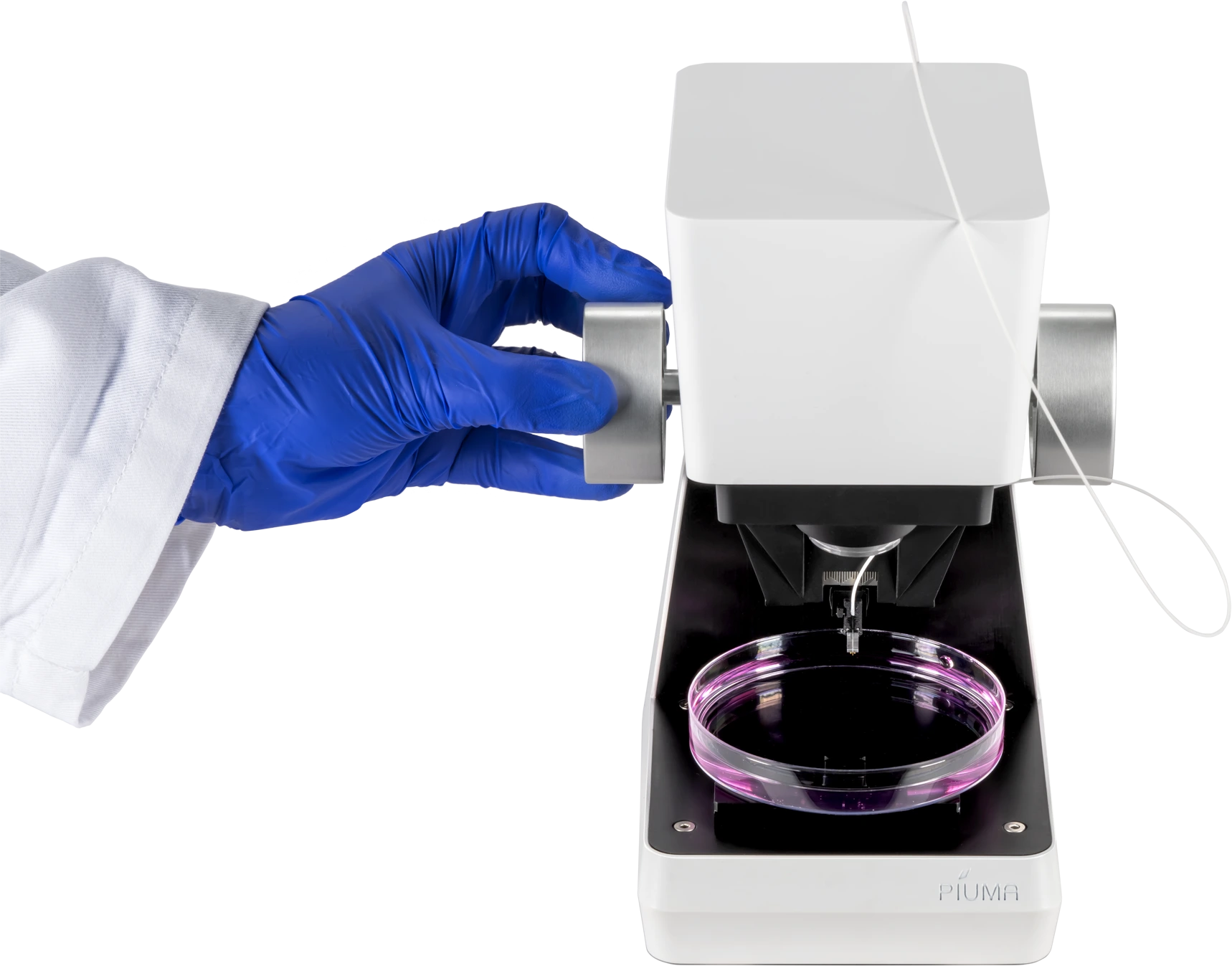
Measure and control mechanobiology, at the cell scale and beyond
Map the biomechanical environment of your samples, such as ex vivo tissues. Leverage this knowledge to build the next generation of biomaterials or in vitro models. Due to the unique application of innovative technology, Piuma can perform mechanical mapping from sub-cellular scale to whole tissue samples spanning several centimeters, without compromising data quality.
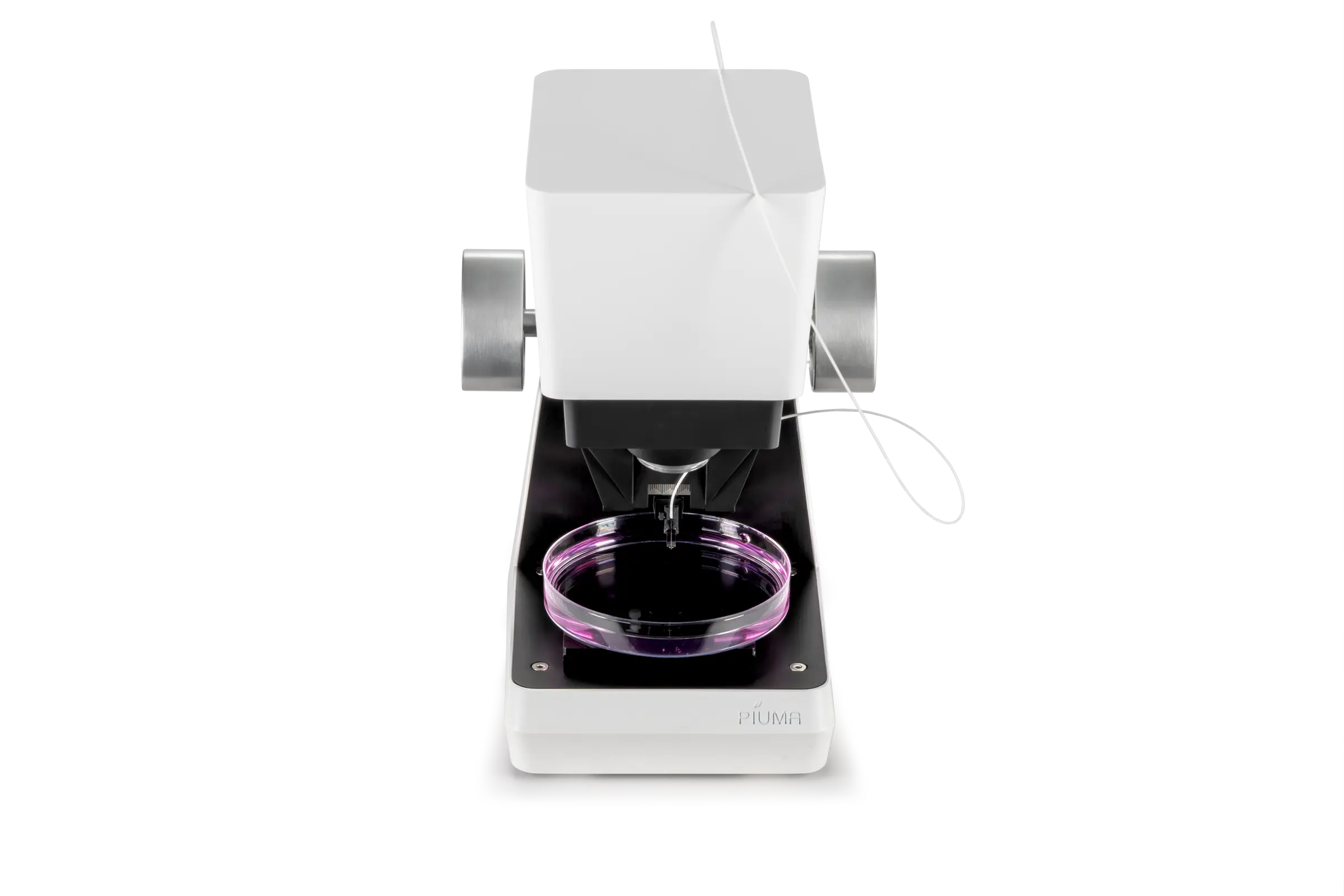
Biologically relevant results
Measure soft (biological) materials in situ and under near physiological conditions, enabling repeated and non-destructive measurements on live samples over time. Use mechanics as a label-free biomarker to track the state of a disease model, the remodeling action of a drug, or the degradation dynamics of a hydrogel.
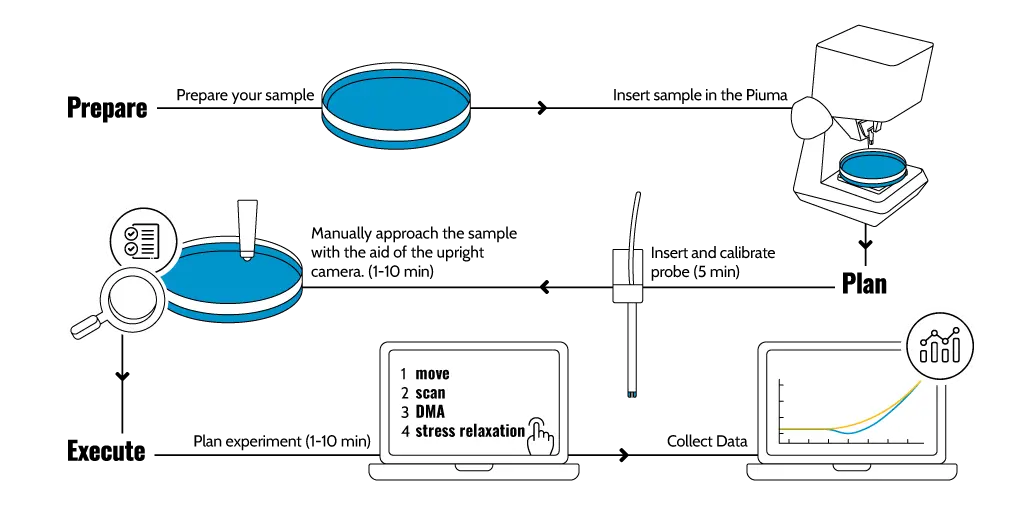
Schedule a meeting to discover what Piuma can mean for your research!
Applications
Piuma is a gateway to advanced material science mechanical characterization, offering robust precision for a multitude of sample sizes, from the intricacies of extracellular matrix (ECM) to the versatility of hydrogels. Its compact form is a boon for space-conscious labs, ensuring a swift integration into diverse research workflows. With the capability to scrutinize materials across scales,
Piuma becomes indispensable for in-depth mechanobiological exploration, from wound healing to cultured meat development. Researchers tackling disease areas like cancer or fibrosis, or addressing testing needs in degradability or mechanobiology research, will find Piuma’s ease of use and rapid operation essential for accelerating research.
By application area
Wound healing
In vitro culturing
Eye care and medical devices
Tissue regeneration
Cartilage regeneration
Skin regeneration
Cultured meat
Key features
Piuma is a compact platform designed to measure the mechanical properties of complex and irregular materials such as large tissues, biomaterials, and hydrogels within physiological conditions. It non-destructively characterizes soft materials from micro to macro scales, providing a more comprehensive profile of their mechanical fingerprint. Featuring easy sample mounting for nearly any container size, high sensitivity, a wide operating range, and the capability to measure in liquids without special prerequisites, this system is highly adaptable for any laboratory.
Incredible flexibility
Spatial Resolution Excellence
Our system is equipped with closed-loop XY stages, offering sub-micrometer positioning accuracy across 12 mm in each direction. This capability enables quick and precise measurements with incredible ease. Complementing this, the Z stage boasts a 12 mm travel range and a fine 80 nm encoder resolution. Paired with our diverse range of probes, it allows for adjustable contact radius between 500 nm and 50 µm. This adaptability is key for accurately conforming to samples with highly irregular surfaces, ensuring detailed and reliable measurements across a variety of sample types.
Micro-Rheology Capabilities
Our advanced system incorporates a feedback loop that facilitates high-precision measurements in quasi-static, stress relaxation/creep, and dynamic* indentation scenarios. These capabilities ensure exceptional accuracy in both force sensing and indentation-depth control. This precision is crucial for accurately assessing complex mechanical properties like nonlinearity, adhesion, viscoelasticity, and poroelasticity, providing detailed insights into material behaviors.
*Optional feature
Data you can trust
Every probe is assembled and pre-calibrated at Optics11 life headquarters, using state of the art metrology equipment. Curious about how we do it? You can check our peer-reviewed method here.
Once you start an experiment, the software guides you through its preparation, to ensure reliable results for every experiment. Save your experimental steps as protocols, allowing you to reproduce or share your methods whilst minimizing human errors.
Trusted by
experts

Prof. Dr. Ir. Smit
Dept. Orthopaedic Surgery, VU University Medical Centre Amsterdam, The Netherlands.




